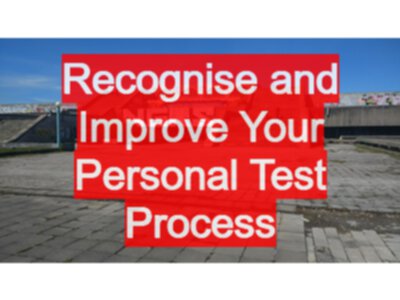I believe that everyone has a unique and personal test process. Also, when we accept this, we can grow our testing skills further and faster than if we pursue the traditional path of learning a common body of knowledge.
Learn your traditions
We do have a tradition of common terms and information from our ‘craft’ - techniques, tactics, and strategies.
For testing we have named techniques: “Boundary Value Analysis”, “Equivalence Partition Analysis”. We have named ‘types’ of testing: “Performance Testing”, “Functional Testing”, “Integration Testing”. And named approaches to testing “Structured Testing”, “Exploratory Testing”.
A shared tradition uses names to make it easier to pass on knowledge to the next generation and to support communication between people in the craft.
Whether we agree on the what the names stand for is a different discussion, at this point I want to acknowledge that such names exist, and are in common use.
Learn your environment
We also have common environmental factors - technology, process, methodologies, and tools. These may vary from company to company because each company is a slightly different environment. We also have environments that we can model in parallel to the company - “Web”, “Cloud”, “Desktop”, “Service”. When we learn about the environments we will learn the common terminology and concepts within those.
We can go far in our career by simply learning these common concepts. And we can have a pretty easy ride if we choose to take on board the most commonly accepted definitions for the commonly used concepts.
Make them your own
But it we want to get really good then we have to make those concepts our own.
Because we will have our unique perception of the environments and its process. We will have our level of understanding of the technology, our prioritization of techniques, our implementation of techniques and tactics.
Recognize that you may identify nuances that are not part of the ‘common’ understanding. You will encounter situations where the ‘common’ technique does not apply without customization and tailoring.
Build on tradition
I do recommend that we learn the ‘common’ ground:
- read the books,
- blogs,
- magazines,
- understand the terminology,
- learn the techniques,
- etc.
I also see massive value in recognizing your uniqueness.
- what questions do you have about the techniques?
- what insights have you gained?
- when you communicated with someone outside the craft, what words did you have to use to be understood?
- what doesn’t gel? It might mean you haven’t understood something, but it might mean that you have new insights yet to uncover.
- how do you do it? Perhaps you have nuances that make you efficient?
Recognize your nuances
For years I took for granted certain nuances in my approach to documenting my testing, this meant that when I started exploratory testing I had very comprehensive notes and couldn’t really understand the controversy that “Exploratory Testing is undocumented” because it wasn’t when I did it.
Each of us do things that other people don’t do, and when those differences make us efficient, then other people can benefit from learning about them. And we can benefit by refining, and improving them.
I’ve written about this over the years, and most recently I tried to stress this viewpoint in my book “Dear Evil Tester” - a humorous book with a serious intent.
Build a Personal Process
The phrase. and concept, “Personal Test Process” really came together for me after I read Watt Humphrey’s “Personal Software Process” book. Watt Humphrey’s book offered a very structured and formal approach to identifying and improving your process. And for me it was overly structured and formal, but, reading his approach helped me and I took from it one key aspect, which was journaling and documenting my approach.
I had always kept notes as I tested because I’ve been reading Productivity and Time Management books for decades, and continually trying to refine an ‘ultimate time management’ approach. But it was at this point that I realized I really needed to improve, and I now:
- write down what I plan to do
- write down what I did
- write down how I did it
- write down what I learned from doing it
- write down thoughts as I did it - questions, risks, realizations, etc.
And all of that, helped me ‘see’ that I had a Personal Test Process - it was written down in front of me, and as I wrote it, it expanded because I could reflect on it.
I contend that you have a unique and very personal test process. And the way you will improve is by fully acknowledging your uniqueness and taking steps to make it more visible to you such that you can reflect on it, and push it further.
Links:







